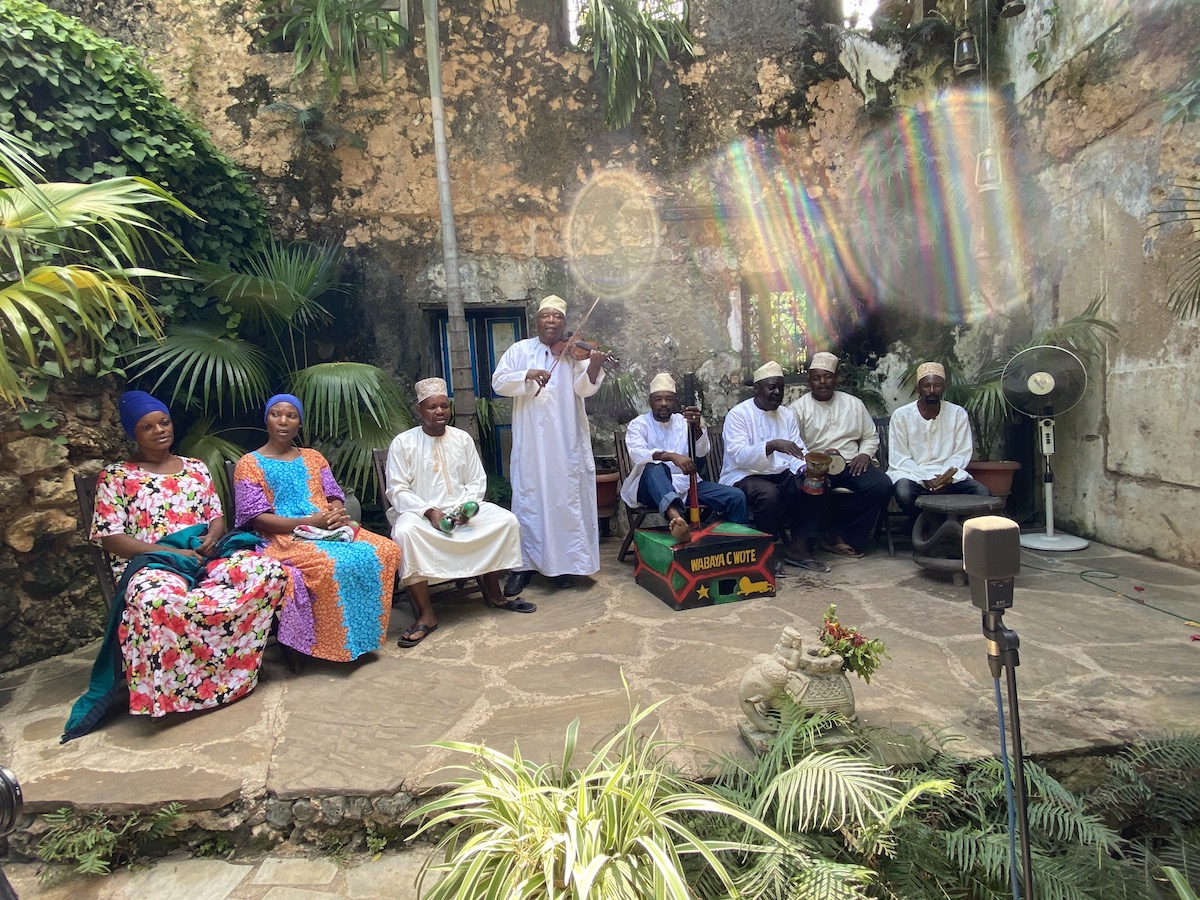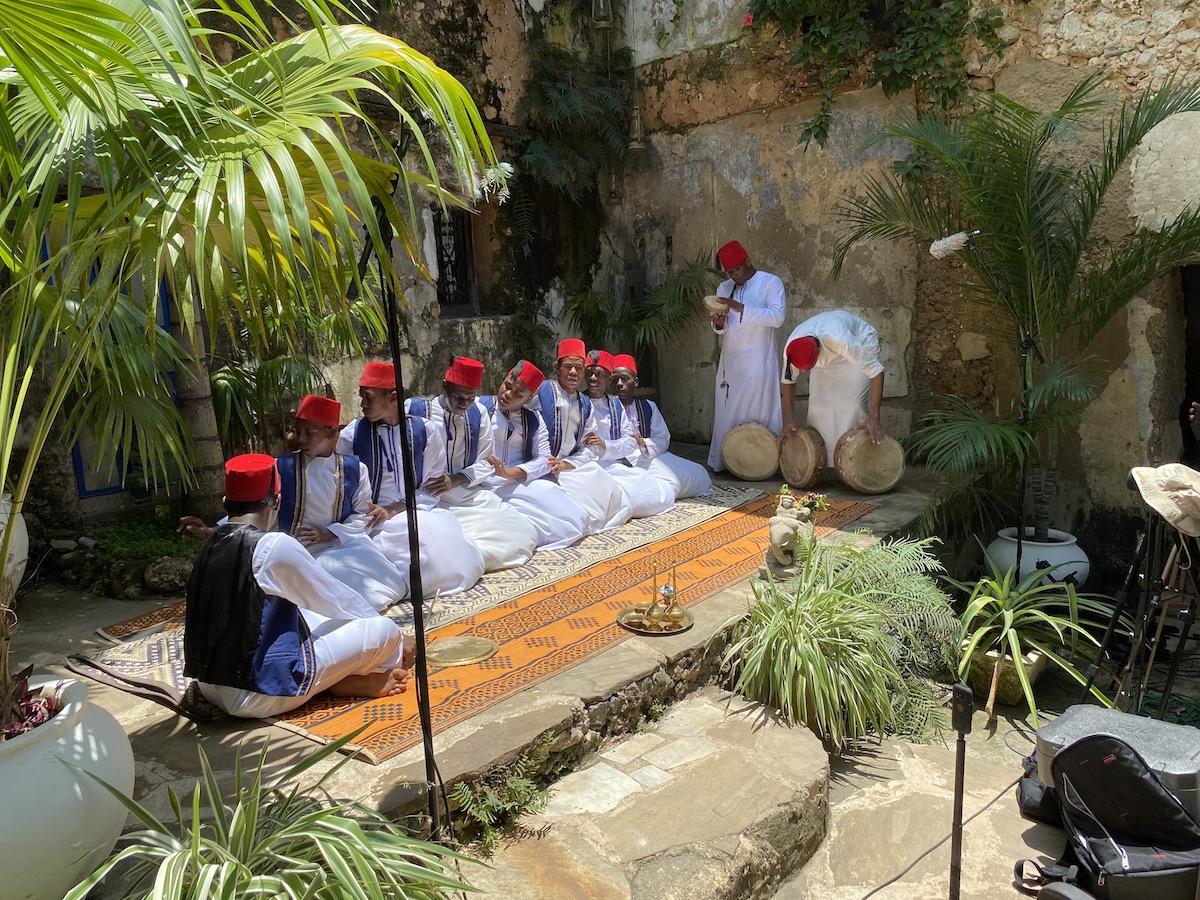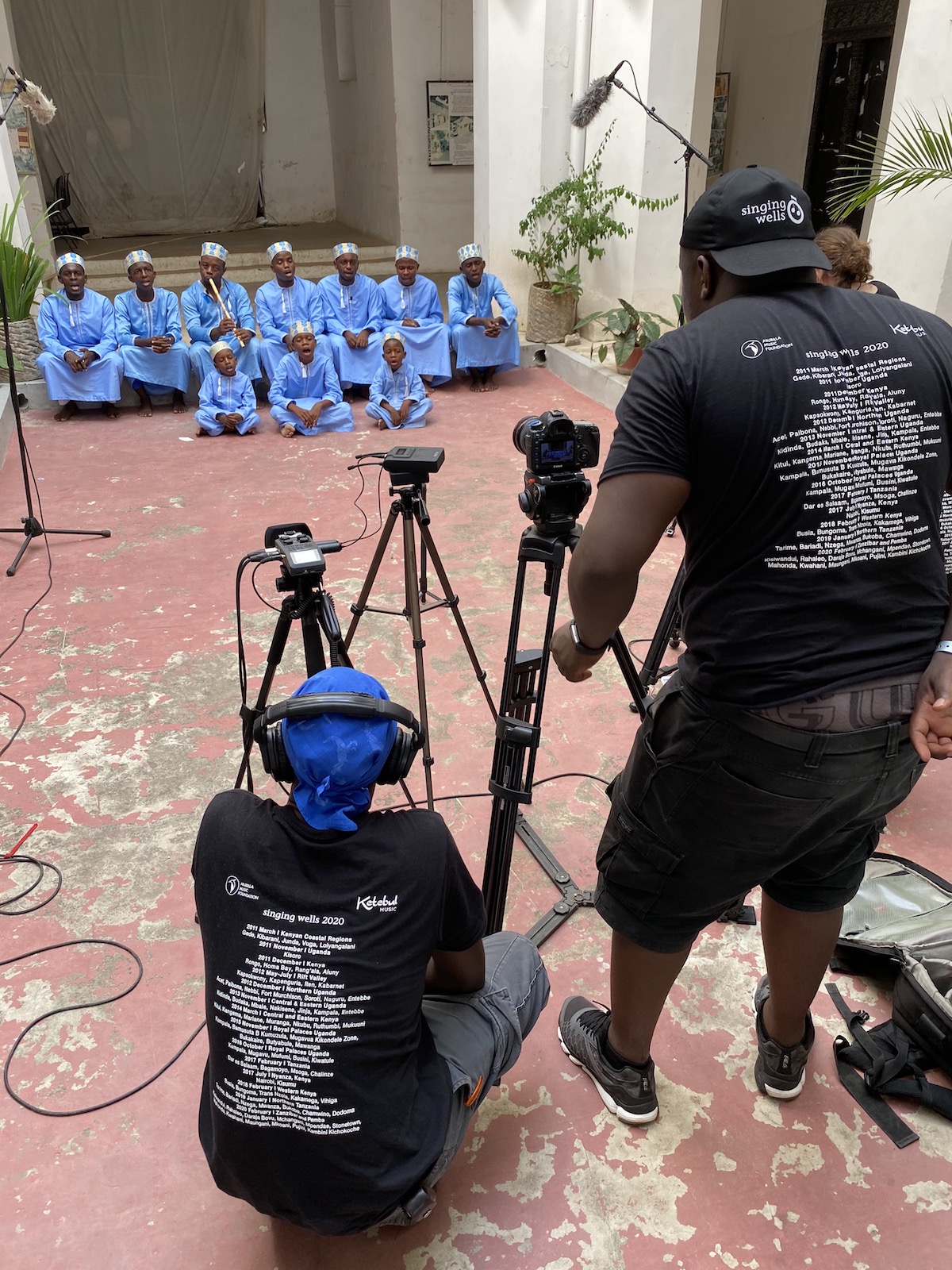Our second day we drove into Stone Town. We recorded the first two groups at the Emerson Spice Hotel along the seaside. This hotel is an Arab style hotel, reminiscent of the rhiads in Marrakech with lots of small courtyards. In the Emerson Spice Hotel we filmed the first two groups in a courtyard usually used for meals in the hotel. While it became very hot as the sun hit the stage for the second group, the overall setting was beautiful – a lush green courtyard, with incredible music. The hotel was very gracious to allow us to record in their ‘secret garden’ especially when our recording sessions overlapped with lunch. We greeted many hotel guests with a surprise recording session, which we hoped they enjoyed. The two groups were:
- Mohamed Othman Kidumbak Group – This group is led by Mohamed Othman Faki who teaches music in the DCMA. Kidumbak is a musical style with three main influences: Taarab, Unyago and Rumba. Dumba stands for a large drum. So Kidumba is a smaller, bongo style drum. Adding Ki to the beginning of the word makes it small. Mohamed Othman had no musicians in his family. He became interested in Kidumbak style music at 16 and taught himself the violin and bass. He went to Egypt off and on for six years on a scholarship from the DCMA to study violin and the oud starting in 2000. He’s been teaching at the academy for 18 years.

Members of this group include: Mohamed Othman Faki – leader, on violin, Kheri Mizaka Aliy on African Bass, Makame Ali Juma on drum, Buruhami Makame Haji on 2nd drum, Mgeni Seleiman Makame on sticks, Said Ame Othman on shakers, Aikazija Abdala Ame -dancer, Mirianaharus Juma Hamis – dancer. All sang but Mohamed Othman Faki was lead singer.
Sanduku , the bass, was a homemade bass made of a large box with a small hole cut out in the front. It had a large stick which the player held perpendicular to the box with a string going from the top of the stick to the top of the box. He changed notes by holding the string less or more taut as well as holding the end of the string down against the stick. Pretty amazing bass sounds came out of this.
The two dancers danced with almost a belly dancing movement where they moved their hips and buttocks completely independently of the rest of their bodies. They wore a sash around their hips to accentuate the movements.
Songs:
- Ewe Mwana Mimi Nakwambia – this means Hey baby, listen to me. A love song telling the woman he loves, Mwana, to be patient
- Yalait – Love song to Yalait, a woman’s name
- Hongera Mwanangu – Congratulations my child, used for weddings to congratulate the newlyweds or the bride.
- Muhogo Wa Jangombe – Means cassava of Jongombe. In Swahili these songs don’t tell you directly what they are trying to say. They use metaphor and analogies. Here the message is: “Don’t insult the midwife because you might need her again.” The song is about not taking cassavas for granted.
- Kidole Chauma Sana – translates to “My Finger is Painful.” Again, this is not the direct meaning. It’s a naughty song with sexual connotations about the man’s hand being worn out.
- Urithi Group – Group of 10 young men dressed in white robes, blue vests and red Fez hats. Their whole group has 20 members. They are a Suki group which originally came from Yemen. However, these men were born and raised in Zanzibar. They had created this goup in April 2019 to sing and perform movements to celebrate the Prophet Mohammed. Their songs consist of chanting praising Mohammed along with rhythmic movements of their arms, bodies and heads. They created a wave pattern with their bodies that was amazing to watch. They sing for weddings, celebrations and festivals. They sing in a mix or Arabic and Swahili.

They could not break their performance into individual songs so they broke it down into three acts so it could be filmed.
- Dakha 1
- Dakha 2
- Dakha 3
Singers/Performers names: Nasir Sallum Juma (lead singer), Said Issa Khamis (drums), Rashid Haroum Rashid, Wissam Omar Rashid, Humaid Abdul, Abdallah, Salum Ali Juma (drums), Abdallah Moha Khamis, Mohamed Rashid Mohamed, Aidha Ghalib Salum, Saleh Ahmed Thabit.
This group had a very unique sound with beautifully choreographed movements. We met their patron Farouque Abdela (“Designer for Diana”) who had helped them develop their look and movements. They had one lead singer and two men on drums. One planning a small drum and the other playing three large drums on the floor while he stood and leaned over. Overall they were very impressive and unique. Truly beautiful.
3. Zam Zam Group – From the hotel we moved on to the Dhow Countries Musical Academy, which is located in the old custom house. Here, we recorded the Zam Zam group on the ground floor, in the center court under an open roof three stories above. Made for the perfect backdrop to Zam Zam’s choir. Their leader and teacher is Ibrahim Ali Hassan. He teaches and performs in Nyumba Ya Vipaji, The House of Talent, in Rahaleo. All male group ranging from age 7 up to 40, ten all together today. They sing Islamic and secular songs for weddings and celebrations. Today was mainly an acapello performance with one flute made out of a bamboo stick.
The singers included: Ibrahim Ali Hassan (lead singer, flute ), Issa Ali Hassan (lead singer), Mlenge Ali Hassan, Othman Mlenge Ali, Afann Mlenge Ali, Iddi Abdallah Mohd, Abdillah Salum Juma (lead singer), Fesal Sleiman Mwalim, Saidi Simai Mkanga, Vuai Juma Vuai. Ibrihim Ali Hassan has two brothers and two sons (youngest is 10) in this group.

Songs:
- Mzuri Sana Nabia – About the Prophet Mohamed
- Yaa Nabia Salamu Alaika – Greeting for the Prophet Mohamed sung in Arabic.
- Hongera Bwana Harusi – Congratulations to the bride and groom
- Ilifurahika – The whole world is rejoicing after the battle of the prophets
- Ndoa Ni Sunna Adhimu – Perfect Marriage
